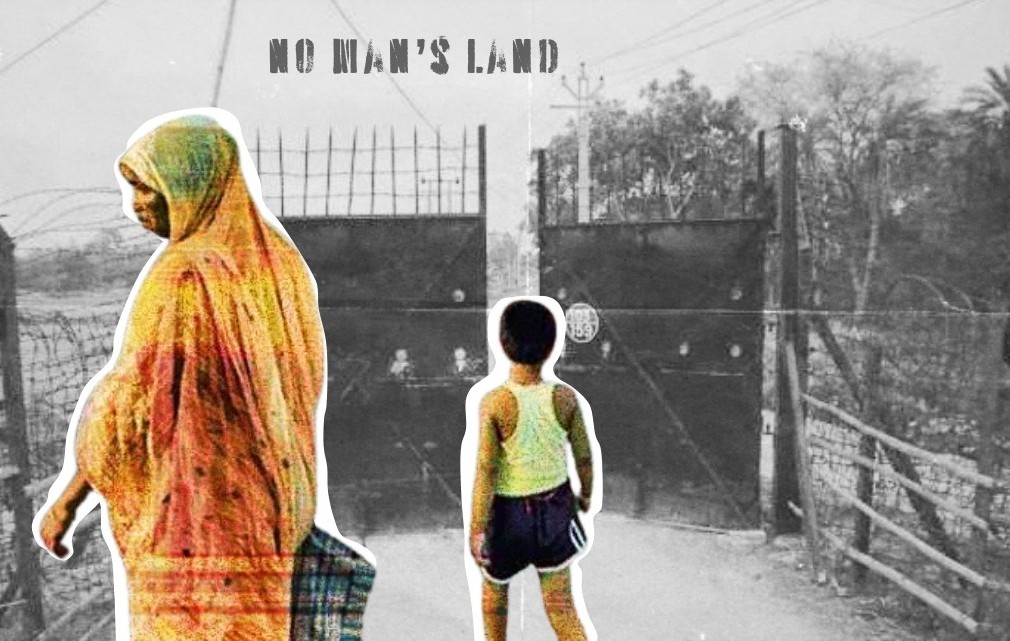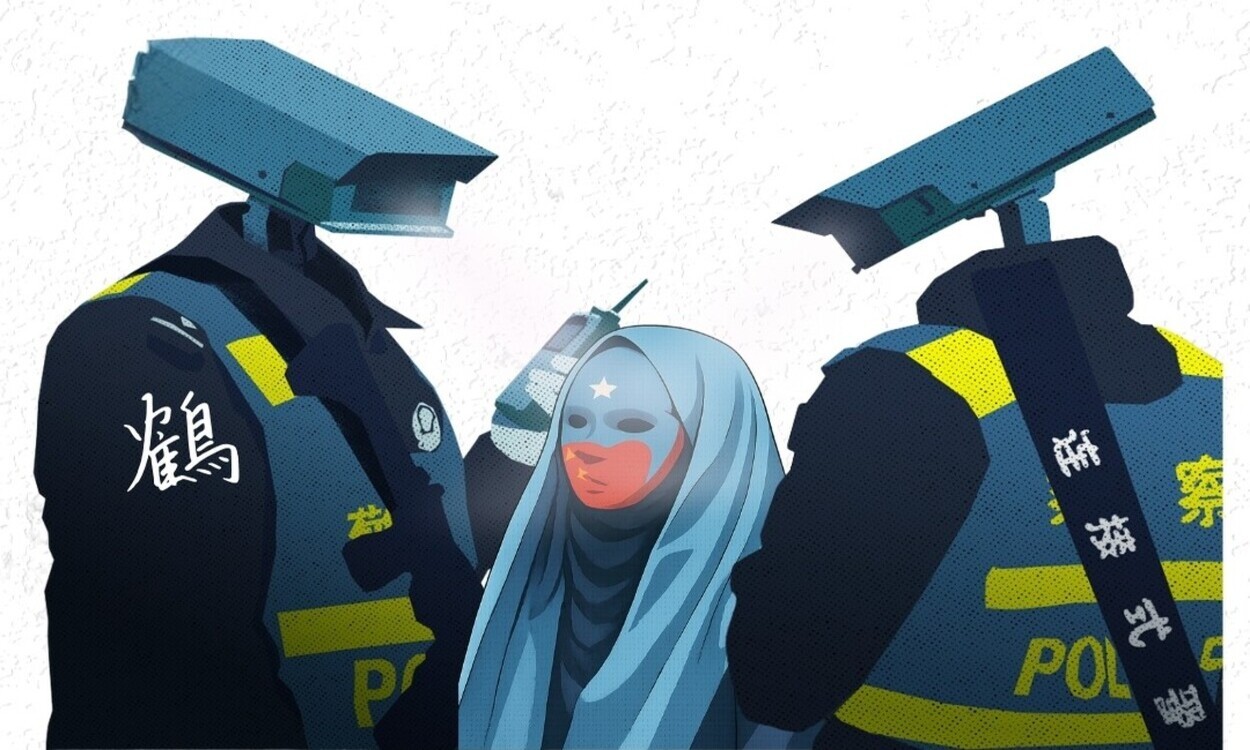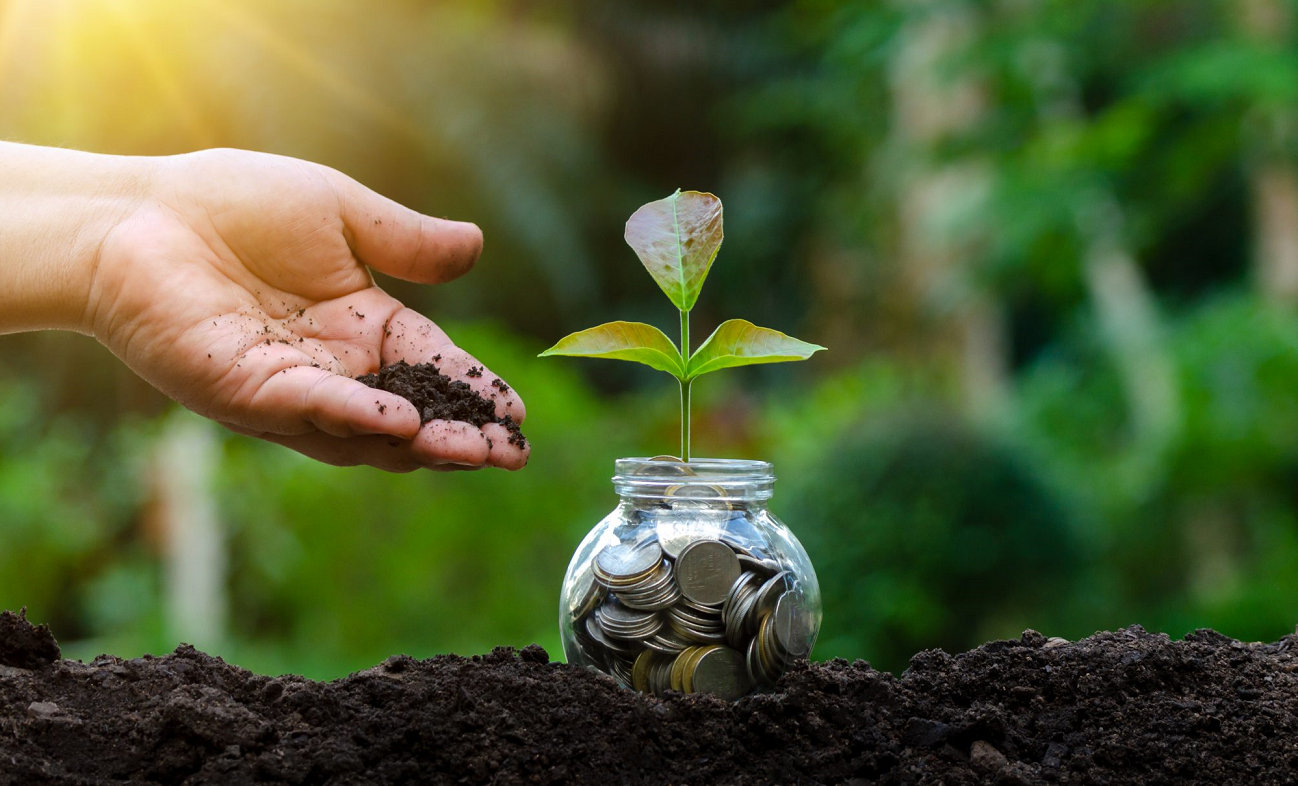
Green Islamic Finance: An Eco-Islamic Approach
Originating centuries ago, the concept of sustainability has evolved in definition and scope in response to changes within economic and social frameworks. In our contemporary world, sustainability, spanning economic, environmental, and social dimensions, resonates across all aspects of life, demanding collaboration on both regional and global scales. The notion of sustainability, solidified by the United Nations’ adoption of the Sustainable Development Goals (SDGs) in 2016, and the concept of green transformation through the European Green Deal (EGD) embraced by the European Union (EU), have taken their places on the world agenda.
Centred around the environmental, social, and governance (ESG) dimensions, sustainable development’s environmental facet encompasses carbon emissions, energy efficiency, and climate change. Its social dimension encompasses areas like human resource management, health, and safety. In parallel, the governance dimension incorporates business ethics, corruption, culture, and values. As a component of the European Green Deal (EGD), the EU climate law targets a reduction in net greenhouse gas emissions by a minimum of 55% by 2030, relative to 1990 levels. To achieve this, measures like the Carbon Border Adjustment Mechanism have been introduced, affecting not just EU member states but also nations engaged in trade with the EU. Evidently, the pursuit of sustainable development and green transformation underscores the substantial financing required for the envisaged policies and initiatives.
"The notion of sustainable finance encourages investors to incorporate environmental, social, and governance factors into their investment choices."
The global financial sector has also begun to align with sustainability and green transformation goals, with numerous international financial institutions unveiling their policies concerning green finance. Evolving within this context, the notion of sustainable finance encourages investors to incorporate environmental, social, and governance factors into their investment choices. Green finance, on the other hand, focuses on environmental factors such as reducing pollution and carbon emissions. Various institutions establish diverse principles and standards to serve as shared reference points for environmentally conscious investors. Market-leading guidelines for different thematic financing instruments like sustainability, green, social, climate, and transformation-oriented financial tools have been published by organizations such as the International Capital Market Association (ICMA), the European Union, and the Climate Bonds Initiatives in addition to these, the United Nations Principles for Responsible Investment (PRI) were established to encourage the inclusion of ESG factors in the investment decision-making process. The general criteria outlined in these guidelines encompass using bond issuance proceeds for environmentally sustainable activities, determining the alignment of funded projects with their operational scope, ensuring transparent management and traceable utilization of issuance proceeds, and providing regular reporting on the allocation of funds.
Islamic Financial Institutions Embrace Green Transformation
Islamic financial institutions are contributing to the field of sustainability and actively participating in the process of green transformation. The natural alignment between Islamic finance and ESG principles has become more pronounced in recent years as governments, multilateral financial institutions, and industry players have increasingly started using Islamic financial instruments to fund impact projects. Malaysia, for instance, conducted its first green sukuk issuance in 2017 to finance sustainable and climate-resilient economic growth. Despite the assertion of a natural synergy between Islamic finance principles and ESG principles, the debut of the first green sukuk issuance took place approximately a decade after the introduction of green bonds. This delay could be attributed to a relatively subdued enthusiasm within the Islamic finance sector for such initiatives (REDmoney Group, 2022a).
With a strong commitment to supporting the green transformation process, the Islamic Development Bank (IsDB) is actively working to harness the potential of Islamic finance as a powerful instrument. Within this framework, its key focal points encompass expanding green finance in Islamic capital markets, fostering the development of green sukuk instruments, promoting green banking, and bolstering green microfinance (Refas et al., 2022). Notably, the IsDB stands as the first multilateral bank to issue green sukuk, which incidentally marked the maiden issuance of green sukuk in Euros as well (WorldBank, 2020). Sustainability bonds, green sukuk, and other relevant sukuk categories are required to conform not only to the international principles and standards mentioned earlier but also to be in harmony with Islamic finance principles. Consequently, these instruments appeal to a wider segment of investors, not only to investors seeking Islamic finance, but also to those interested in venturing into the realms of green and sustainable investments.
Green Islamic Finance in Muslim Countries
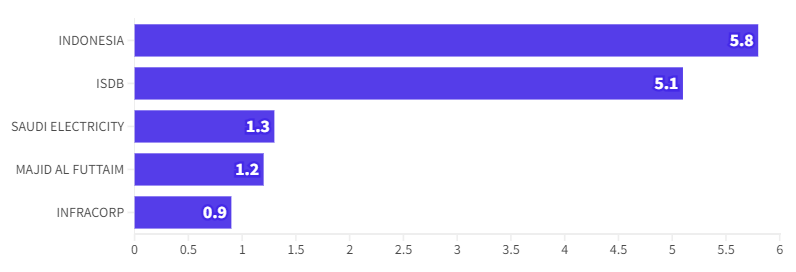
Shape 1. The Largest Green Sukuk Issuers (Billions of Dollars, 2017-2022)
Source: Green and Sustainability Sukuk Report 2022: Financing a Sustainable Future
In 2021, the issuance of green bonds and sustainability bonds reached $6.1 billion, which then amounted to $4.4 billion in the first half of 2022. However, these bond issuances account for only 1% of the total ESG bond issuance and 4% of the total sukuk issuance. While green sukuk constituted 91% of the ESG sukuk market in 2019, this figure dropped to 26% in 2021 due to the impact of the COVID-19 pandemic. Indonesia, the pioneer of green sukuk issuance in 2018 and the first to issue retail green sukuk in 2019, remains the largest issuer of green sukuk. Green and sustainability sukuk constituted 80% of the green and sustainability bonds sold by GCC-based issuers in the first half of 2022 (Taitoon et al., 2022). Back in 2018, Indonesia and GCC nations were responsible for 53% of the total issuance size for green and sustainability sukuk. In 2022›s initial two months, Saudi Arabia led the global ESG sukuk market by issuing a total of $1.5 billion in ESG sukuk, with Indonesia and Malaysia securing the second and third positions in ESG sukuk issuance (Halawi, 2022).
In the first half of 2022, the total size of green and sustainability bonds and sukuk issued by member countries of the Association of Southeast Asian Nations (ASEAN) amounted to $27.2 billion. Within the ASEAN region, 58% of issuers have established ESG frameworks in their organizations, leading to a growing number of investors considering ESG in their investments. Voluntary Carbon Markets (VCM) have also started capturing the interest of investors in Islamic finance markets. Abu Dhabi Global Market has partnered with AirCarbon Exchange to establish a carbon trading exchange and clearinghouse, while Bursa Malaysia is working on a Sharia-compliant VCM (GKP) (Taitoon et al., 2022). Islamic banks are actively introducing new Islamic ESG products to the market. Qatar’s Masraf Al Rayan bank, for instance, launched the Sustainable Finance Framework and initiated a Sharia-compliant green deposit program (REDmoney Group, 2022b).
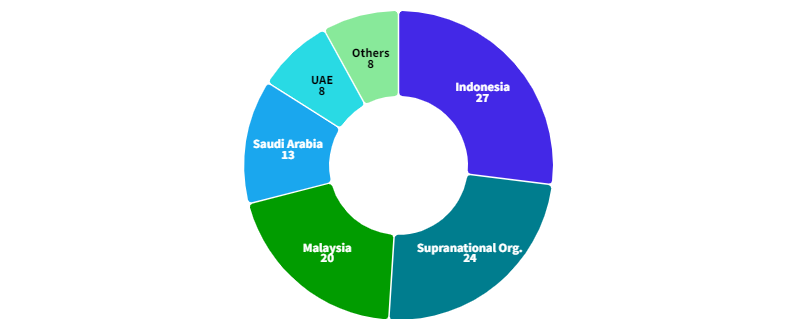
Shape 2. Cumulative Issuance of Green and Sustainability Sukuk by Country, (%, 2017-2022)
Source: Green and Sustainability Sukuk Report 2022: Financing A Sustainable Future
In Türkiye, both public institutions and financial entities are actively advancing initiatives for green and sustainable financing, as well as bond and sukuk issuances. The Ministry of Treasury and Finance has crafted the “Sustainable Finance Framework Document” designed for green bond and sukuk issuance within the global ESG bond market. In parallel, the Capital Markets Board has released comprehensive guidelines pertaining to green and sustainable bonds, alongside lease certificates. Meanwhile, the Banking Regulation and Supervision Agency has revealed the “2022-2025 Sustainable Banking Strategic Plan”. In Türkiye, the first green sukuk issuance took place in 2021 by Türkiye Emlak Participation Bank, followed by a second green sukuk issuance by the Türkiye Wealth Fund (Tekdoğan, 2023). Additionally, ING Türkiye bank successfully concluded its first syndicated loan linked to sustainability in 2021, with the bank announcing that the generated funds would be employed for general trade finance purposes. Conversely, Borsa Istanbul introduced the BIST Sustainable Participation Index in 2021, catering to investors seeking to invest in equities that meet both participation and sustainability criteria.
Financial instruments in the realm of green and sustainable finance undergo additional review processes and face distinct risks due to the necessity of complying with both the criteria applied to conventional instruments and Shariah compliance requirements. Despite this, alignment between Islamic finance principles and the goals of sustainability and green transformation provides an advantage for the sector, even though Islamic financial institutions and instruments are subject to this additional cost-bearing situation. To encourage a more active role of Islamic financial institutions in the processes of sustainability and green transformation, policies need to be developed that not only alleviate the additional cost burden but also capitalize on their advantageous position.
References
Halawi, A. (2022, March 9). How is Islamic finance responding to the drive towards sustainable investing? Refinitiv Perspectives. https://refini.tv/3YHaQhs
REDmoney Group. (2022a). ISFI Annual Report 2022. Islamic Sustainable Finance & Investment. https://bit.ly/3OLRHGo
REDmoney Group. (2022b). Islamic Sustainable Finance & Investment Forum 2022 Review. Islamic Sustainable Finance & Investment. https://bit.ly/3OKRtiH
Refas, S., Hughes, K., Javier, E., & Hiller, B. (2022, December 7). Islamic Finance Can Be a Powerful Tool to Boost Climate Action. Islamic Development Bank. https://bit.ly/3OIfYgG
Taitoon, J. A., Adil, M., Ansari, R. A., Omar, S., Tait, C., & Hayat, U. (2022). Green and Sustainability Sukuk Report 2022. Refinitiv.
Tekdoğan, Ö. F. (2023). Yeşil Dönüşümde İslami Finans Kuruluşlarının Çalışmaları ve Katkıları. İçinde Türkiye’de Yeşil Ekonomi: Dönüşüm İçin Bir Yol Haritası (ss. 50-63). İlke Vakfı. https://bit.ly/3KODTKm
WorldBank. (2020). Pioneering the Green Sukuk: Three Years On. World Bank. http://hdl.handle.net/10986/3456
Ömer Faruk Tekdoğan
Ankara Üniversitesi Sosyal Bilimler Üniversitesi İslam Ekonomisi ve Finansı Bölümü'nde öğretim üyesi olarak çalışmalarını sürdürmektedir....
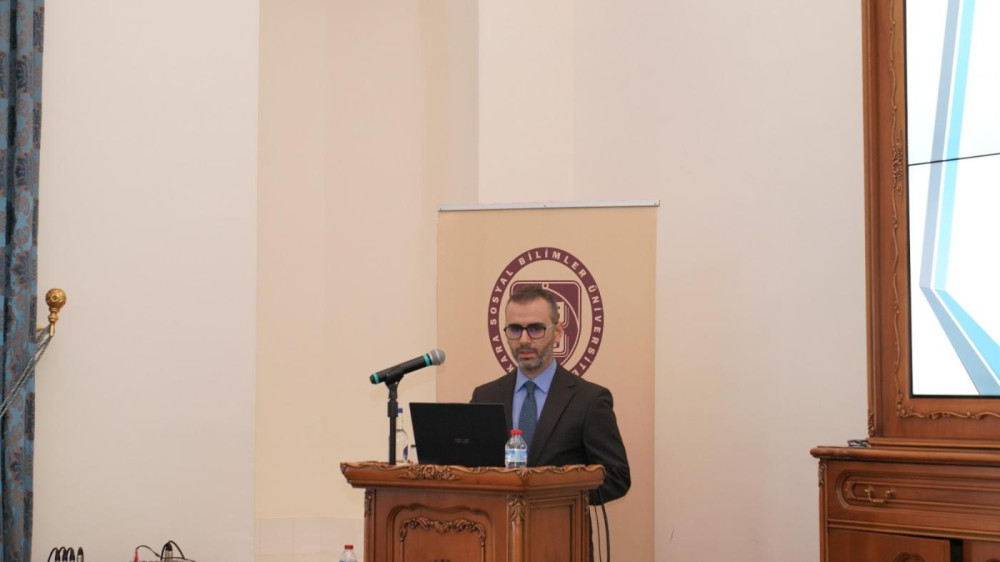 Ömer Faruk Tekdoğan
Ömer Faruk Tekdoğan